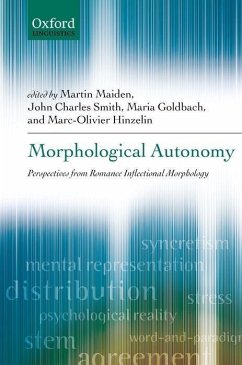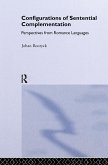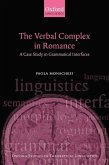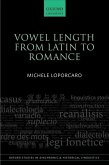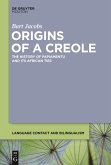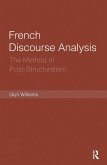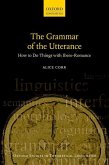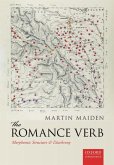Morphological Autonomy
Perspectives from Romance Inflectional Morphology
Herausgeber: Maiden, Martin; Hinzelin, Marc-Olivier; Goldbach, Maria; Smith, John Charles
Morphological Autonomy
Perspectives from Romance Inflectional Morphology
Herausgeber: Maiden, Martin; Hinzelin, Marc-Olivier; Goldbach, Maria; Smith, John Charles
- Gebundenes Buch
- Merkliste
- Auf die Merkliste
- Bewerten Bewerten
- Teilen
- Produkt teilen
- Produkterinnerung
- Produkterinnerung
This book is about the nature of morphology and its place in the structure of grammar. Drawing on a wide range of aspects of Romance inflectional morphology, leading scholars present detailed arguments for the autonomy of morphology, ie morphology has phenomena and mechanisms of its own that are not reducible to syntax or phonology. But which principles and rules govern this independent component and which phenomena can be described or explicated by the mechanisms of the morphemic level? In shedding light on these questions, this volume constitutes a major contribution to Romance historical…mehr
![Configurations of Sentential Complementation Configurations of Sentential Complementation]() Johan RooryckConfigurations of Sentential Complementation171,99 €
Johan RooryckConfigurations of Sentential Complementation171,99 €![The Verbal Complex in Romance The Verbal Complex in Romance]() Paola MonachesiThe Verbal Complex in Romance92,99 €
Paola MonachesiThe Verbal Complex in Romance92,99 €![Vowel Length from Latin to Romance Vowel Length from Latin to Romance]() Michele LoporcaroVowel Length from Latin to Romance188,99 €
Michele LoporcaroVowel Length from Latin to Romance188,99 €![Origins of a Creole Origins of a Creole]() Bart JacobsOrigins of a Creole120,99 €
Bart JacobsOrigins of a Creole120,99 €![French Discourse Analysis French Discourse Analysis]() Glyn WilliamsFrench Discourse Analysis171,99 €
Glyn WilliamsFrench Discourse Analysis171,99 €![The Grammar of the Utterance The Grammar of the Utterance]() Alice CorrThe Grammar of the Utterance117,99 €
Alice CorrThe Grammar of the Utterance117,99 €![The Romance Verb The Romance Verb]() Martin MaidenThe Romance Verb146,99 €
Martin MaidenThe Romance Verb146,99 €-
-
-
- Produktdetails
- Verlag: Sydney University Press
- Seitenzahl: 400
- Erscheinungstermin: 15. Oktober 2011
- Englisch
- Abmessung: 236mm x 160mm x 30mm
- Gewicht: 907g
- ISBN-13: 9780199589982
- ISBN-10: 0199589984
- Artikelnr.: 33252660
- Verlag: Sydney University Press
- Seitenzahl: 400
- Erscheinungstermin: 15. Oktober 2011
- Englisch
- Abmessung: 236mm x 160mm x 30mm
- Gewicht: 907g
- ISBN-13: 9780199589982
- ISBN-10: 0199589984
- Artikelnr.: 33252660
* Part 1: Autonomous Morphology - Corroborations and Challenges
* 1: Stephen R. Anderson: Stress-Conditioned Allomorphy in Surmiran
(Rumantsch)
* 2: Martin Maiden: Morphomes and 'Stress-Conditioned Allomorphy' in
Romanh
* 3: Judith Meinschaefer: Accentual Patterns in Romance Verb Forms
* 4: Paul O'Neill: Morphomes, Morphemes, and Morphological
Segmentation: Evidence From Ibero-Romance
* 5: Sascha Gaglia: Representational Aspects of Morphomic Vowel
variation in Southern Italy
* 6: Andrew Swearingen: The Romance Imperative, Irregular Morphology,
Syncretism, and the Morphome
* 7: Vito Pirrelli, Marcello Ferro, and Basilio Calderone: Learning
Paradigms in Time and Space. Computational Evidence From Romance
Languages
* 8: Rafael Linares: Conjugations and Complex Stems in Spanish Verbs:
Generalization Properties and Priming Effects
* Part 2: Evolution of Stem Allomorphy
* 9: Max Wheeler: The Evolution of a Morphome in Catalan Verb
Inflection
* 10: Maria Goldbach: Metaphony in Portuguese 3rd Class -o(C)C-ir and
-u(C)C-ir Verbs - Comparison With Modern Galician and Mediaeval
Galician-Portuguese
* 11: Ana R. Luis: Morphomic Structure and Loan-Verb Integration:
Evidence From Lusophone Creoles
* Part 3: Interfaces With Syntax or Semantics?
* 12: Xu, Zheng and mark Aronoff: A Realization Optimality-Theoretic
Approach to Full and Partial Identity of Forms
* 13: Marc-Olivier Hinzelin: Syncretism and Suppletion in Gallo-Romance
Verb Paradigms
* 14: John Charles Smith: Variable Analyses of a Verbal Inflection in
(mainly) Canadian French
* 15: Michele Loporcaro: Syncretism and neutralization in the Marking
of Romance Object Agreement
* 16: Anna M. Thornton: Overabundance (Multiple Forms Realizing the
Same Cell): A Non-Canonical Phenomenon in Italian Verb Morphology
* 17: Cinzia Russi: Clitics of Italian Verbi Procomplementari: What are
They?
* 18: Catherine Taylor: Periphrasis in Romance
* 19: Nigel Vincent: Non-Finite Forms, Periphrases, and Autonomous
Morphology in Latin and Romance
* References
* Index
* Part 1: Autonomous Morphology - Corroborations and Challenges
* 1: Stephen R. Anderson: Stress-Conditioned Allomorphy in Surmiran
(Rumantsch)
* 2: Martin Maiden: Morphomes and 'Stress-Conditioned Allomorphy' in
Romanh
* 3: Judith Meinschaefer: Accentual Patterns in Romance Verb Forms
* 4: Paul O'Neill: Morphomes, Morphemes, and Morphological
Segmentation: Evidence From Ibero-Romance
* 5: Sascha Gaglia: Representational Aspects of Morphomic Vowel
variation in Southern Italy
* 6: Andrew Swearingen: The Romance Imperative, Irregular Morphology,
Syncretism, and the Morphome
* 7: Vito Pirrelli, Marcello Ferro, and Basilio Calderone: Learning
Paradigms in Time and Space. Computational Evidence From Romance
Languages
* 8: Rafael Linares: Conjugations and Complex Stems in Spanish Verbs:
Generalization Properties and Priming Effects
* Part 2: Evolution of Stem Allomorphy
* 9: Max Wheeler: The Evolution of a Morphome in Catalan Verb
Inflection
* 10: Maria Goldbach: Metaphony in Portuguese 3rd Class -o(C)C-ir and
-u(C)C-ir Verbs - Comparison With Modern Galician and Mediaeval
Galician-Portuguese
* 11: Ana R. Luis: Morphomic Structure and Loan-Verb Integration:
Evidence From Lusophone Creoles
* Part 3: Interfaces With Syntax or Semantics?
* 12: Xu, Zheng and mark Aronoff: A Realization Optimality-Theoretic
Approach to Full and Partial Identity of Forms
* 13: Marc-Olivier Hinzelin: Syncretism and Suppletion in Gallo-Romance
Verb Paradigms
* 14: John Charles Smith: Variable Analyses of a Verbal Inflection in
(mainly) Canadian French
* 15: Michele Loporcaro: Syncretism and neutralization in the Marking
of Romance Object Agreement
* 16: Anna M. Thornton: Overabundance (Multiple Forms Realizing the
Same Cell): A Non-Canonical Phenomenon in Italian Verb Morphology
* 17: Cinzia Russi: Clitics of Italian Verbi Procomplementari: What are
They?
* 18: Catherine Taylor: Periphrasis in Romance
* 19: Nigel Vincent: Non-Finite Forms, Periphrases, and Autonomous
Morphology in Latin and Romance
* References
* Index

